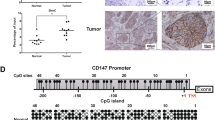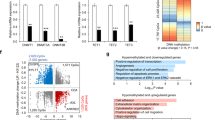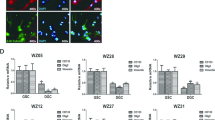Abstract
Cisplatin-based chemotherapy is the paradigm of non-small-cell lung cancer (NSCLC) treatment; however, it also induces de novo DNA-hypermethylation, a process that may be involved in the development of drug-resistant phenotypes by inactivating genes required for drug-cytotoxicity. By using an expression microarray analysis, we aimed to identify those genes reactivated in a set of two cisplatin (CDDP) resistant and sensitive NSCLC cell lines after epigenetic treatment. Gene expression, promoter methylation and CDDP-chemoresponse were further analyzed in three matched sets of sensitive/resistant cell lines, 23 human cancer cell lines and 36 NSCLC specimens. Results revealed specific silencing by promoter hypermethylation of IGFBP-3 in CDDP resistant cells, whereas IGFBP-3 siRNA interference, induced resistance to CDDP in sensitive cells (P<0.001). In addition, we found a strong correlation between methylation status and CDDP response in tumor specimens (P<0.001). Thus, stage I patients, whose tumors harbor an unmethylated promoter, had a trend towards increased disease-free survival (DFS). We report that a loss of IGFBP-3 expression, mediated by promoter-hypermethylation, results in a reduction of tumor cell sensitivity to cisplatin in NSCLC. Basal methylation status of IGFBP-3 before treatment may be a clinical biomarker and a predictor of the chemotherapy outcome, helping to identify patients who are most likely to benefit from CDDP therapy alone or in combination with epigenetic treatment.
This is a preview of subscription content, access via your institution
Access options
Subscribe to this journal
Receive 50 print issues and online access
$259.00 per year
only $5.18 per issue
Buy this article
- Purchase on Springer Link
- Instant access to full article PDF
Prices may be subject to local taxes which are calculated during checkout





Similar content being viewed by others
Abbreviations
- ATCC:
-
American Type Culture Collection
- BS:
-
bisulfite sequencing
- CDDP:
-
cisplatin
- DFS:
-
disease-free survival
- ECACC:
-
European Collection of Cell Cultures
- IGFBP-3:
-
insulin-like growth factor binding protein-3
- MSP:
-
methylation-specific PCR
- NSCLC:
-
non-small-cell lung cancer
- TSG:
-
tumor suppressor gene
References
(2003). The World Cancer Report—the major findings. Cent Eur J Public Health 11: 177–179.
Baker EK, Johnstone RW, Zalcberg JR, El-Osta A . (2005). Epigenetic changes to the MDR1 locus in response to chemotherapeutic drugs. Oncogene 24: 8061–8075.
Baylin SB, Herman JG, Graff JR, Vertino PM, Issa JP . (1998). Alterations in DNA methylation: a fundamental aspect of neoplasia. Adv Cancer Res 72: 141–196.
Belinsky SA, Klinge DM, Stidley CA, Issa JP, Herman JG, March TH et al (2003). Inhibition of DNA methylation and histone deacetylation prevents murine lung cancer. Cancer Res 63: 7089–7093.
Buckbinder L, Talbott R, Velasco-Miguel S, Takenaka I, Faha B, Seizinger BR et al (1995). Induction of the growth inhibitor IGF-binding protein 3 by p53. Nature 377: 646–649.
Carvalho AL, Jeronimo C, Kim MM, Henrique R, Zhang Z, Hoque MO et al (2008). Evaluation of promoter hypermethylation detection in body fluids as a screening/diagnosis tool for head and neck squamous cell carcinoma. Clin Cancer Res 14: 97–107.
Chang YS, Kong G, Sun S, Liu D, El-Naggar AK, Khuri FR et al (2002a). Clinical significance of insulin-like growth factor-binding protein-3 expression in stage I non-small cell lung cancer. Clin Cancer Res 8: 3796–3802.
Chang YS, Wang L, Liu D, Mao L, Hong WK, Khuri FR et al (2002b). Correlation between insulin-like growth factor-binding protein-3 promoter methylation and prognosis of patients with stage I non-small cell lung cancer. Clin Cancer Res 8: 3669–3675.
Chattopadhyay S, Machado-Pinilla R, Manguan-Garcia C, Belda-Iniesta C, Moratilla C, Cejas P et al (2006). MKP1/CL100 controls tumor growth and sensitivity to cisplatin in non-small-cell lung cancer. Oncogene 25: 3335–3345.
Esteller M, Hamilton SR, Burger PC, Baylin SB, Herman JG . (1999). Inactivation of the DNA repair gene O6-methylguanine-DNA methyltransferase by promoter hypermethylation is a common event in primary human neoplasia. Cancer Res 59: 793–797.
Gosepath EM, Eckstein N, Hamacher A, Servan K, von Jonquieres G, Lage H et al (2008). Acquired cisplatin resistance in the head-neck cancer cell line Cal27 is associated with decreased DKK1 expression and can partially be reversed by overexpression of DKK1. Int J Cancer 123: 2013–2019.
Gottesman MM . (2002). Mechanisms of cancer drug resistance. Annu Rev Med 53: 615–627.
Guix M, Faber AC, Wang SE, Olivares MG, Song Y, Qu S et al (2008). Acquired resistance to EGFR tyrosine kinase inhibitors in cancer cells is mediated by loss of IGF-binding proteins. J Clin Invest 118: 2609–2619.
Herbst RS, Heymach JV, Lippman SM . (2008). Lung cancer. N Engl J Med 359: 1367–1380.
Huang SS, Huang JS . (2005). TGF-beta control of cell proliferation. J Cell Biochem 96: 447–462.
Ibanez de Caceres I, Dulaimi E, Hoffman AM, Al-Saleem T, Uzzo RG, Cairns P . (2006). Identification of novel target genes by an epigenetic reactivation screen of renal cancer. Cancer Res 66: 5021–5028.
Jemal A, Siegel R, Ward E, Hao Y, Xu J, Murray T et al (2008). Cancer statistics, 2008. CA Cancer J Clin 58: 71–96.
Katsaros D, Cho W, Singal R, Fracchioli S, Rigault De La Longrais IA, Arisio R et al (2004). Methylation of tumor suppressor gene p16 and prognosis of epithelial ovarian cancer. Gynecol Oncol 94: 685–692.
Koul S, McKiernan JM, Narayan G, Houldsworth J, Bacik J, Dobrzynski DL et al (2004). Role of promoter hypermethylation in cisplatin treatment response of male germ cell tumors. Mol Cancer 3: 16.
Levina V, Marrangoni AM, DeMarco R, Gorelik E, Lokshin AE . (2008). Drug-selected human lung cancer stem cells: cytokine network, tumorigenic and metastatic properties. PLoS ONE 3: e3077.
Leyland-Jones B, Kelland LR, Harrap KR, Hiorns LR . (1999). Genomic imbalances associated with acquired resistance to platinum analogues. Am J Pathol 155: 77–84.
Makarla PB, Saboorian MH, Ashfaq R, Toyooka KO, Toyooka S, Minna JD et al (2005). Promoter hypermethylation profile of ovarian epithelial neoplasms. Clin Cancer Res 11: 5365–5369.
Marks PA, Richon VM, Miller T, Kelly WK . (2004). Histone deacetylase inhibitors. Adv Cancer Res 91: 137–168.
McKeage MJ . (1995). Comparative adverse effect profiles of platinum drugs. Drug Saf 13: 228–244.
Merlo A, Herman JG, Mao L, Lee DJ, Gabrielson E, Burger PC et al (1995). 5′ CpG island methylation is associated with transcriptional silencing of the tumour suppressor p16/CDKN2/MTS1 in human cancers. Nat Med 1: 686–692.
Morgillo F, Kim WY, Kim ES, Ciardiello F, Hong WK, Lee HY . (2007). Implication of the insulin-like growth factor-IR pathway in the resistance of non-small cell lung cancer cells to treatment with gefitinib. Clin Cancer Res 13: 2795–2803.
Morgillo F, Woo JK, Kim ES, Hong WK, Lee HY . (2006). Heterodimerization of insulin-like growth factor receptor/epidermal growth factor receptor and induction of survivin expression counteract the antitumor action of erlotinib. Cancer Res 66: 10100–10111.
Morris MR, Gentle D, Abdulrahman M, Clarke N, Brown M, Kishida T et al (2008). Functional epigenomics approach to identify methylated candidate tumour suppressor genes in renal cell carcinoma. Br J Cancer 98: 496–501.
Nyce J . (1989). Drug-induced DNA hypermethylation and drug resistance in human tumors. Cancer Res 49: 5829–5836.
Nyce JW . (1997). Drug-induced DNA hypermethylation: a potential mediator of acquired drug resistance during cancer chemotherapy. Mutat Res 386: 153–161.
Perry AS, Loftus B, Moroose R, Lynch TH, Hollywood D, Watson RW et al (2007). In silico mining identifies IGFBP3 as a novel target of methylation in prostate cancer. Br J Cancer 96: 1587–1594.
Plasencia C, Martinez-Balibrea E, Martinez-Cardus A, Quinn DI, Abad A, Neamati N . (2006). Expression analysis of genes involved in oxaliplatin response and development of oxaliplatin-resistant HT29 colon cancer cells. Int J Oncol 29: 225–235.
Plumb JA, Strathdee G, Sludden J, Kaye SB, Brown R . (2000). Reversal of drug resistance in human tumor xenografts by 2′-deoxy-5-azacytidine-induced demethylation of the hMLH1 gene promoter. Cancer Res 60: 6039–6044.
Rajah R, Valentinis B, Cohen P . (1997). Insulin-like growth factor (IGF)-binding protein-3 induces apoptosis and mediates the effects of transforming growth factor-beta1 on programmed cell death through a p53- and IGF-independent mechanism. J Biol Chem 272: 12181–12188.
Riedel RF, Porrello A, Pontzer E, Chenette EJ, Hsu DS, Balakumaran B et al (2008). A genomic approach to identify molecular pathways associated with chemotherapy resistance. Mol Cancer Ther 7: 3141–3149.
Roninson IB . (2003). Tumor cell senescence in cancer treatment. Cancer Res 63: 2705–2715.
Shen DW, Su A, Liang XJ, Pai-Panandiker A, Gottesman MM . (2004). Reduced expression of small GTPases and hypermethylation of the folate binding protein gene in cisplatin-resistant cells. Br J Cancer 91: 270–276.
Steele N, Finn P, Brown R, Plumb JA . (2009). Combined inhibition of DNA methylation and histone acetylation enhances gene re-expression and drug sensitivity in vivo. Br J Cancer 100: 758–763.
Strathdee G, MacKean MJ, Illand M, Brown R . (1999). A role for methylation of the hMLH1 promoter in loss of hMLH1 expression and drug resistance in ovarian cancer. Oncogene 18: 2335–2341.
Wiley A, Katsaros D, Fracchioli S, Yu H . (2006). Methylation of the insulin-like growth factor binding protein-3 gene and prognosis of epithelial ovarian cancer. Int J Gynecol Cancer 16: 210–218.
Yoon JH, Dammann R, Pfeifer GP . (2001). Hypermethylation of the CpG island of the RASSF1A gene in ovarian and renal cell carcinomas. Int J Cancer 94: 212–217.
Zhang P, Wang J, Gao W, Yuan BZ, Rogers J, Reed E . (2004). CHK2 kinase expression is down-regulated due to promoter methylation in non-small cell lung cancer. Mol Cancer 3: 14.
Zochbauer-Muller S, Fong KM, Virmani AK, Geradts J, Gazdar AF, Minna JD . (2001). Aberrant promoter methylation of multiple genes in non-small cell lung cancers. Cancer Res 61: 249–255.
Acknowledgements
We gratefully acknowledge Javier Perez for the artwork and to J Siegfried, for the English correction of the manuscript. Ibanez de Caceres was partially supported by the Fondo de Investigacion Sanitaria (ISCIII) through the ‘Miguel Servet’ program (CP 08/000689; PI-717). Note: Supported by FIS PI06-1234, PI08-1485, PS09/00472 and Fundación Médica Mutua Madrileña.
Author information
Authors and Affiliations
Corresponding author
Additional information
Supplementary Information accompanies the paper on the Oncogene website (http://www.nature.com/onc)
Supplementary information
Rights and permissions
About this article
Cite this article
Ibanez de Caceres, I., Cortes-Sempere, M., Moratilla, C. et al. IGFBP-3 hypermethylation-derived deficiency mediates cisplatin resistance in non-small-cell lung cancer. Oncogene 29, 1681–1690 (2010). https://doi.org/10.1038/onc.2009.454
Received:
Revised:
Accepted:
Published:
Issue Date:
DOI: https://doi.org/10.1038/onc.2009.454
Keywords
This article is cited by
-
Expression characteristics and their functional role of IGFBP gene family in pan-cancer
BMC Cancer (2023)
-
DNA and histone modifications as potent diagnostic and therapeutic targets to advance non-small cell lung cancer management from the perspective of 3P medicine
EPMA Journal (2022)
-
Clinical validation of a novel quantitative assay for the detection of MGMT methylation in glioblastoma patients
Clinical Epigenetics (2021)
-
Insulin-like growth factor binding protein 3 promotes radiosensitivity of oral squamous cell carcinoma cells via positive feedback on NF-κB/IL-6/ROS signaling
Journal of Experimental & Clinical Cancer Research (2021)
-
Transcriptional epigenetic regulation of Fkbp1/Pax9 genes is associated with impaired sensitivity to platinum treatment in ovarian cancer
Clinical Epigenetics (2021)



